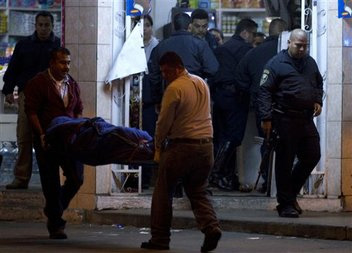
|  |  |  News Around the Republic of Mexico News Around the Republic of Mexico  
Detainee Says Mexico's La Familia Gang in Decline
 E. Eduardo Castillo - Associated Press E. Eduardo Castillo - Associated Press
go to original
November 19, 2010


| | Forensics carry a corpse from a mini-market as city police investigate in the Zona Norte area of Tijuana, Mexico, late Tuesday Nov. 16, 2010. According to residents at the scene, a man was shot to death in the store. (AP/Guillermo Arias) |  |
Mexico City — A captured drug trafficker said Wednesday that the boss of one of Mexico's fiercest cartels is physically and emotionally drained and that the leader's recent offer to disband the gang is real.

Sergio Moreno Godinez, known as "Yellow," said La Familia was behind a letter last week that offered to dissolve if the government will protect citizens in the western state of Michoacan, where the cartel is based.

The cartel is in decline and leader Servando Gomez, a.k.a. "La Tuta," has suggested they give up, Moreno said in an interrogation video released by Mexico's federal police.

"The organization ... is in decline, it's very badly structured," Moreno said.

Saying that La Tuta "seems exhausted, Moreno added, "It's like he doesn't want problems."

Police say Moreno, who was arrested Tuesday, was the major trafficker for La Familia in the port city of Lazaro Cardenas.

La Familia, Mexico's main trafficker of methamphetamine, captured nationwide attention in 2006 by rolling severed heads into a disco in the mountain town of Uruapan.

Shortly afterward, President Felipe Calderon intensified the war on drug cartels, sending thousands of federal troops and police into Michoacan, his home state.

The government has since deployed tens of thousands of federal forces to drug trafficking hotspots across Mexico. Several kingpins have been captured or killed, but cartel violence has soared, claiming more than 28,000 lives in four years.

The violence terrorized parts of Michoacan, one of Mexico's most picturesque states, with a colonial capital, quaint mountain towns, sparkling lakes and famed monarch butterfly sanctuary.

La Familia has been blamed for some of the brashest attacks on security forces, including an ambush that killed 12 federal police officers in June and a spasm of violence last year in which at least 18 police officers were killed.

Last week, in response to the arrest of two members, the gang used burning trucks to block roads into the state capital of Morelia and sprayed a shopping mall with automatic-weapons fire, the state attorney general's office said.

La Familia, however, has sought to convince the public that it is defending Michoacan against other drug gangs. It has distinguished itself by occasionally making public pronouncements and has issued a set of rules for cartel members that proclaim family values and prohibit consuming - but not trafficking - hard drugs.

In the one-page letter dropped last week in the streets of some Michoacan mountain towns and sent as an e-mail to journalists, La Familia said it is willing to disband if federal police promise to act honestly and fight to the death to defend the state.

Experts said the letter could be a sign that the cartel - one of Mexico's newest - is being squeezed out after years of fighting both the government and its rivals.

Authorities have said they could not confirm the authenticity of the letter but that in any case, the federal government does not negotiate with criminals.

In the newly released tape, Moreno said the letter was meant to "clean up the image" of La Familia and pressure the government to withdraw federal police from Michoacan.

The federal police agency sometimes releases interrogation videos after major arrests, and the reliability of the statements made in the tapes have been questioned.

In September, Attorney General Arturo Chavez Chavez said video showing alleged drug lord Edgar Valdez Villarreal giving a rambling account of his drug dealings could not be submitted as evidence because his lawyer was not present.

Chavez said that in formal statements with his lawyer present, Valdez, alias "The Barbie," did not admit to the activities he acknowledged on the tapes.

Kent Schaffer, an attorney for the U.S-born Valdez, has said his client was reading from a script provided to him by police.
|

 |
|  |



